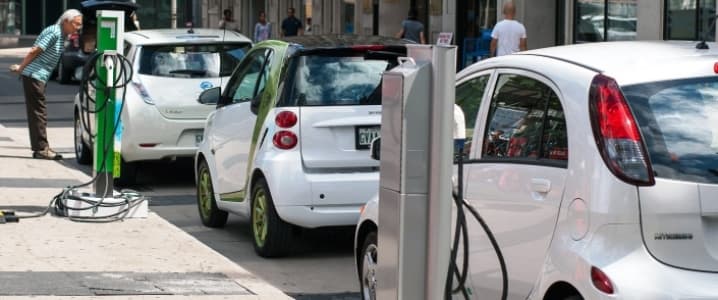China is joining the UK, France, and Norway in banning vehicles powered by fossil fuels.
If China, the world’s largest new vehicle market with sales of 28.03 million units last year, were to ban gasoline and diesel vehicles in the market, the impact on petroleum would be huge. But how pervasive is the fossil-fuel ban in global markets key to new vehicle sales and petroleum consumption?
During an automotive forum over the weekend in Tianjin, Xin Guobin, the vice minister of industry and information technology, said the government is working on a timetable to end production and sales of fossil-fuel powered vehicles.
The national government has been headed in this direction for a few years, issuing generous “new energy vehicle” subsidies to automakers to build electric vehicles and for consumers to buy them. The subsidies are being cut back this year and the government is expected to adopt a zero-emission vehicle mandate similar to California’s where automakers would be mandated to manufacture a set percentage of electric and fuel cell vehicles in the short term.
China is open to direction from other countries as it deals with increasingly crowded cities, booming auto sales, and air pollution in growing metro areas. The country had already committed to cap its carbon emissions by 2030. Related: World’s Largest Car Market Turns To Electric Vehicles
European nations are dealing with backlash from the Volkswagen diesel emissions cheating scandal that started two years ago, with more investigation and pressure coming from nations and the European Union. Diesel-powered cars make up about half the market in Europe with consumers looking for alternatives since the scandal broke. Strict carbon emissions policies are also leading toward banning fossil-fuel powered vehicles.
German chancellor Angela Merkel has suggested that Germany may follow its European neighbors on the fossil-fuel vehicle ban. Seeking her fourth term as chancellor in the Sept. 24 election, Merkel has been facing criticism from her opponent for being too tied to German automakers to enforce strict emissions policies. The German government has become tougher, investigating several automakers since the VW scandal broke in 2015.
A new think piece by a Bloomberg columnist sees the impact of China’s expected decision to have a huge impact on the sale of new vehicles and petroleum in the future.
A chart shows that nearly 80 percent of the global auto market is pushing toward a phase-out of petroleum cars and adoption of electric vehicles. If that comes to be, demand for gasoline and diesel would drop dramatically.
However, there are few major hurdles that must be crossed before this will come anywhere near adoption on a mass scale.
One of them is that the U.S., the world’s largest economy ahead of China, may see its fuel economy and emissions targets softened soon by the federal government. Soon after taking over the White House this year, President Donald Trump announced he would be reconsidering the Obama administration’s mandates over the next year. White House comments indicate the rules will be lightened up.
Trump’s June 1 decision to leave the Paris climate accord also suggests that the federal government is backing off the plan Obama negotiated with automakers a few years ago.
Japan is another country that has yet to ban fossil fuel vehicles. The government has been taking a more cautious approach, supporting efforts by Japanese automakers to embrace hydrogen fuel cell vehicles. But sales of these vehicles have been quite small so far.
The chart shows that so far, Brazil, Canada, Russia, Mexico, and Italy have no significant plans in place toward banning fossil-fuel vehicles. These markets are dependent on oil production and overseas shipment, and may be less inclined to impact the industry through national fossil-fuel mandates.
Related: The North Sea Oil Recovery Is Dead In The Water
ADVERTISEMENT
India has tentative phase-out plans. If the government does issue a mandate, it will have a major impact on the nation that’s expected to soon surpass China in population and that has been seeing new vehicle sales grow in recent years.
For now, the odds are against governments wanting to see fossil-fuel vehicles disappear. Bloomberg New Energy Finance reports that last year, there were about 695,000 electric vehicles sold versus 84 million new vehicles sold worldwide. There are about a billion petroleum-powered vehicles owned around the world. Getting rid of them will take quite a while.
By Jon LeSage for Oilprice.com
More Top Reads From Oilprice.com:
- Can North Korea Survive An Oil Embargo?
- Middle-East Tensions Soar After Critical Phone Call
- Oil Prices Rise As OPEC Oil Production Declines In August



















The big and quick win for all countries trying to reduce emissions is phasing coal out and using nat gas for power generation. Incremental gains by doing other replacements will take decades still.
I don't hold out a lot of hope it can be avoided now.
EV penetration will reach 80% by 2030 with or without these regulations.
It is the the first choice for the Consumer for a wide Variety of reasons ....ICE cars will dominate for decades to come.....